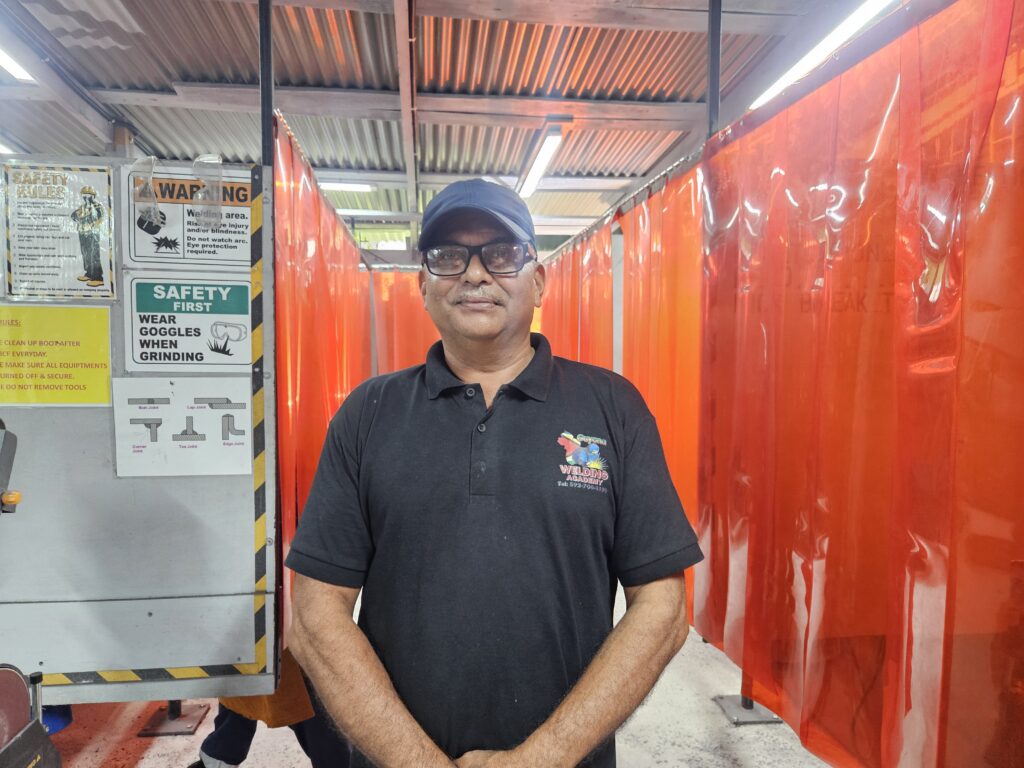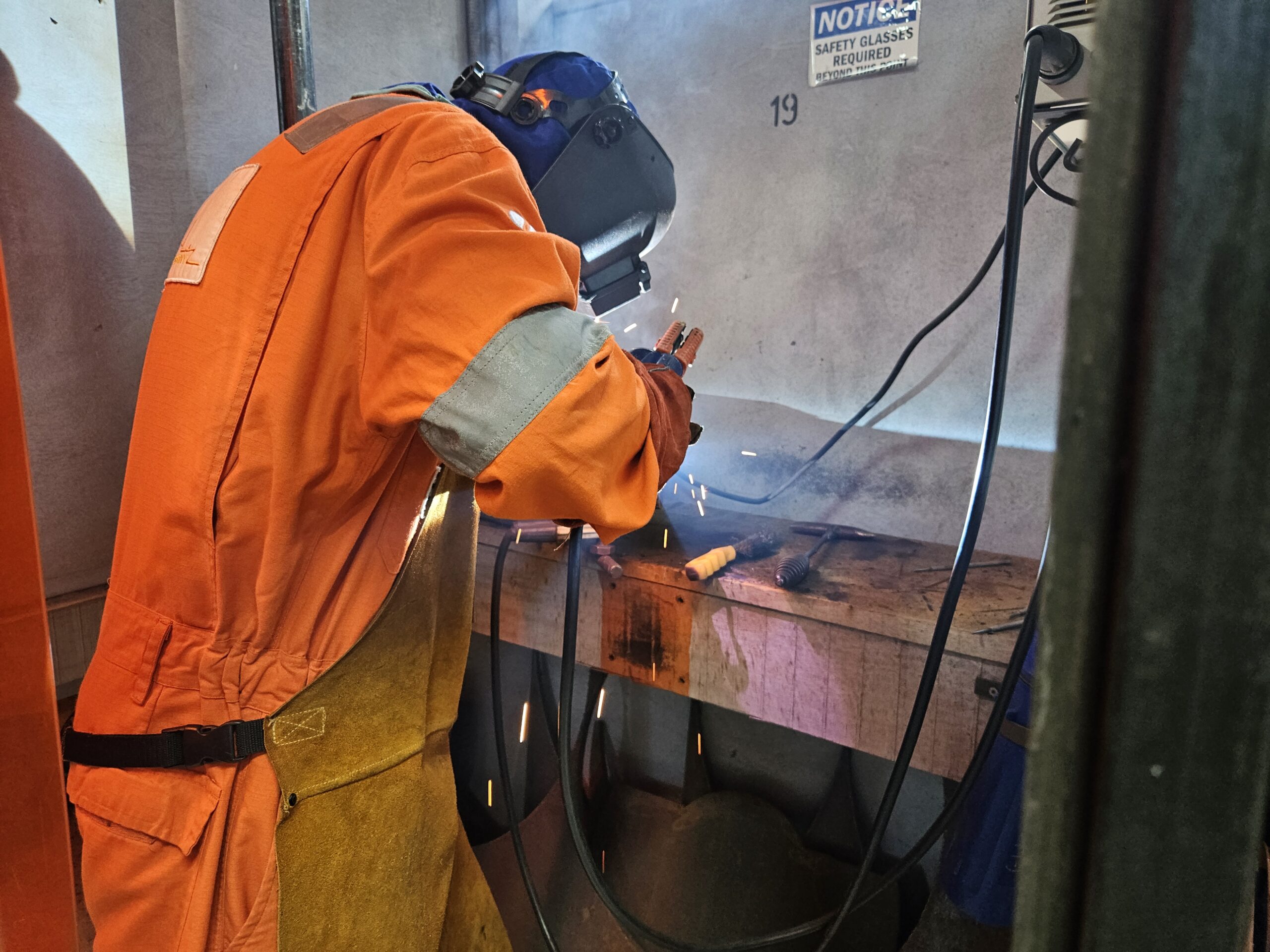- UPDATE: This article has been updated with additional information to reflect that Mohamed Ally is contracted with the School of the Nations to provide welding training for Guyanese. It also clarifies that the School of the Nations is the accredited provider of City and Guilds certification in Guyana. (Article updated by Editor Delana Isles, Sept. 15, 12:30 pm)
For Mohamed Ally, welding is more than sparks and steel; it is legacy work. After more than four decades in the trade, spanning Guyana, Venezuela and the United States, the Guyanese-American welder has returned home to train a new generation for the country’s prolific oil economy.
From his Georgetown-based welding academy, Ally is preparing young Guyanese for high-value careers in oil, gas and construction, which is now central to offshore platforms, fabrication yards, shipyards and deepwater ports.
He has been working in the welding and fabrication field since he was 17 in Guyana before migrating to the United States of America to continue his dream.
“I learned about different alloys, different materials, all kinds of welding. It gave me a solid foundation,” he recalled.
That foundation shaped his career, but when the pandemic hit, Ally began reassessing his life.
“You could live today, die tomorrow. So, what are you doing?” he said, describing the moment of reflection that, coupled with Guyana’s oil economy, convinced him to return home.
Upon his return to Guyana, Ally started small, just ten welding booths. But within months, demand surged.
Ally’s academy is contracted by the School of the Nations to facilitate the training of welders. The School of the Nations is Guyana’s accredited provider for City & Guilds certification, working in collaboration with the Guyana Online Academy of Learning (GOAL) under a government-backed initiative. The programme is designed to train at least 3,000 welders to meet the needs of the oil and gas sector.
Drawing on his decades of international experience, he guides students through processes such as stick, MIG, TIG, torch cutting and fabrication.

He explained that the urgency is clear. Guyana recently brought its fourth mega-project online in just five years, with the startup of the Yellowtail Development.
The ONE GUYANA floating production, storage and offloading (FPSO) vessel, the largest one at the Stabroek Block, has an initial capacity of 250,000 barrels of oil equivalent per day and storage for two million barrels.
Oil production begins at ExxonMobil’s fourth mega-project offshore Guyana | OilNOW
Along with the Liza Destiny, Liza Unity and Prosperity FPSOs, Guyana’s installed capacity now exceeds 900,000 barrels per day.
Every one of these projects requires intensive fabrication, piping and structural support, work that welders make possible.
“The opportunities are endless. Every port, every fabrication yard, every offshore project will need welders. Pipe welding especially is where the demand will be,” Ally said.
With ExxonMobil expanding offshore operations and contractors like TechnipFMC handling fabrication and subsea work, the need for a steady pipeline of skilled workers has never been greater.
Ally’s academy trains students in stick, MIG, TIG, torch cutting and fabrication.
But his mission is not just about skills; it’s also about breaking stereotypes. Although welding remains a male-dominated field, Ally has seen a shift. “In our last batch, nine of the 22 students were women. And to be honest, the women are doing better than the men, they’re more attentive, more patient and more focused,” he explained.
Several female graduates are already working with companies involved in offshore projects, while others have moved into fabrication and construction.
“It’s proof that this is no longer just a man’s trade,” Ally said.
The academy also acts as a job bridge. Ally hires top graduates himself while linking others directly with employers. “Every batch, four or five of them get hired right away. Companies come to us asking for welders,” he said.
For many students, welding provides a path out of precarious work in the informal economy.
“Selling water on the road in the hot sun might get you $10,000 a day. But welding gives you rights, safety and a career,” Ally noted.
Ally’s story reflects a broader national trend. Increasingly, Guyana’s diaspora is returning home, bringing global expertise in energy, engineering, finance and technical trades. For many, it’s about more than profit; it’s about responsibility and legacy.
Irfaan Ali charts oil-fueled, sustainable future as Guyana’s ninth President | OilNOW
At 60, Ally sees his academy as precisely that. “I find joy in giving back. I talk to the students, I share my experience and I watch them grow. That’s what keeps me going,” he said.
Looking ahead, he plans to expand training into pipe welding, directly aligning with offshore requirements. He also hopes to gain formal accreditation through Guyana’s Technical and Vocational Education and Training (TVET) Council, further strengthening his academy’s international recognition.
According to Ally, welders will remain at the heart of Guyana’s transformation, given that, beyond oil and gas, industries such as deepwater ports, new shipyards, and the growing construction sector all depend on them.
“The oil will bring the projects, but welders will build them. If Guyanese are trained now, the jobs will be ours,” he urged.



